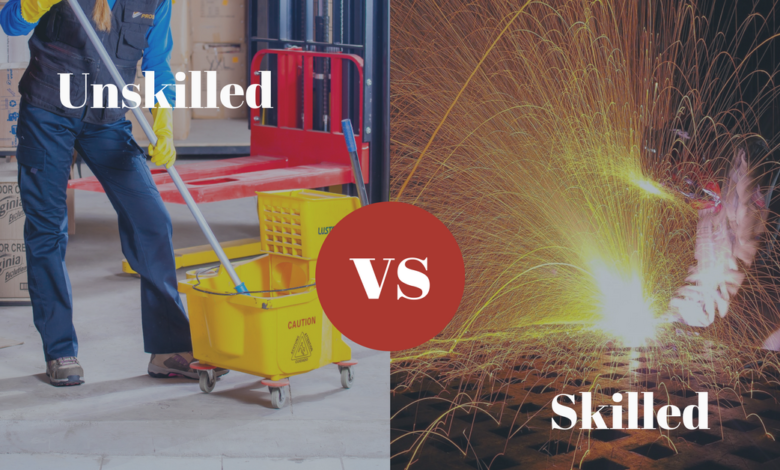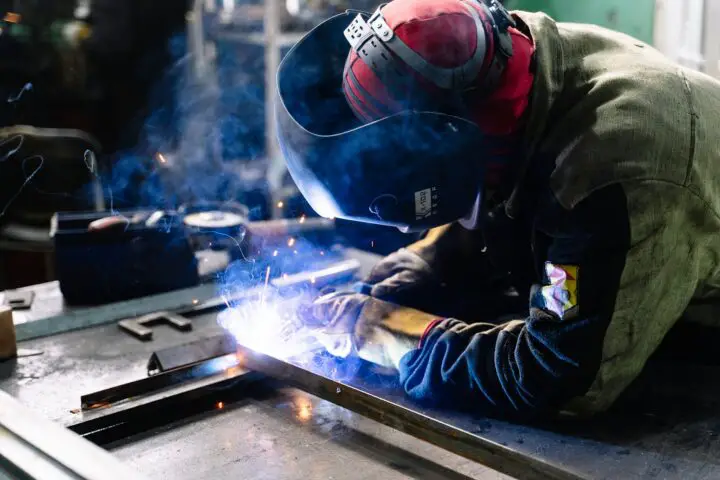Skilled vs. Unskilled Labor: What Really is The Difference?

Labor is a crucial part of a free market economy. It is mentioned in every nation and is vital for the success of the country itself, but also for people doing the jobs.
In order to maximize efficiency and cut costs, manufacturers must develop innovative approaches to managing their workforce.
Skilled laborers and unskilled laborers are the two basic types of workers.
To run a successful business and create high-quality goods, you need a thorough understanding of the differences between the two.
We’ve come up with a clear explanation that will help you see the difference. Keep on reading and find your answers down below.
What is skilled labor?

The term “skilled labor” describes work that requires a specific level of training or skills. In some cases, it may also require a certain degree or school/college education for you to get a job.
Professionals like electricians, administrative assistants, doctors, plumbers, and many more serve as examples of this kind of work, which we will talk about later on.
Workers in skilled labor are either white or blue-collar.
These workers need a special set of skills in order to accomplish their tasks properly.
This implies that they have the skills and knowledge required for their chosen profession, perhaps gained through the successful completion of an academic program in that field.
Due to their training, workers that perform skilled labor frequently earn more money and have greater responsibility at work. It is a better option in the long run.
The future of skilled labor

The skilled workers of the future could differ from the skilled labor of the past and present due to the economy’s quick changes regarding the expansion of knowledge-based jobs.
The “rise of the machine” is causing a lot of discussion and anxiety among skilled people who fear that they may soon lose their jobs to robots or computer algorithms.
Those who have not yet entered the workforce might be curious about the qualifications necessary for productive employment in the future. The future is tech, don’t get us wrong, but how tech can it get in such a short period of time? This is why you shouldn’t worry too much.
What is unskilled labor?

Although skilled laborers hold the bulk of employment in the construction business, there are also a considerable number of unskilled labor opportunities available. These do, however, vary depending on the continent you live in. For instance, over 866,000 Americans are employed as unskilled laborers at the time.
Most people on the outside and those thinking about entering the construction industry have no idea what unskilled workers do on a daily basis. Unskilled labor is not something that just anyone can undertake. It calls for power, accuracy, and meticulousness.
An unskilled worker might perform any of the following duties on a normal day:
- Sweep up the mess
- Create trenches
- Build a scaffolding
- Place the materials (concrete, etc)
- Clear any debris
Although a day in the life of an unskilled laborer isn’t always simple, it is fulfilling employment that many individuals may perform without needing to have a particular degree or diploma. If you are aiming for fun instead of education, this might be the way for you.
Types of unskilled labor jobs

Unskilled workers are those who don’t have a formal degree or work experience in a certain industry.
The importance of this work is on par with that of any skilled labor role.
Without devoted labor, no engineering proposal will ever be implemented.
Despite the normal absence of formal training for specialized workers, abilities in administration, operating machinery, and applying processes are highly valued.
Finding the right fits for firms’ needs in terms of unskilled labor is therefore crucial. Although the pay is adequate, it is not as high as it would be for trained employees.
There’s also mixed labor
Most businesses must employ a mixed-labor approach, where skilled labor can work on areas of specific expertise, and unskilled labor can keep the business going on a day-to-day basis. A successful company values both its skilled and unskilled labor and considers finding the right fit in any job a key part of that success. This is why you shouldn’t have a tough time finding a job, as both options are highly valued.
Types of skilled labor
In today’s competitive employment market, it’s often necessary for candidates to demonstrate proficiency in specialized skills.
Some examples of these professionals are doctors, carpenters, engineers, and architects.
While there are many more to consider, here is a narrowed-down selection, along with some of your most-asked questions about the jobs.
Travel agent

United States annualized median income: $42,746
A travel agent’s main responsibility is to use their regional knowledge to help clients plan and purchase their travel arrangements.
It is the responsibility of a travel agent to help clients make all essential arrangements for their vacations, including hotel, travel, and financial planning.
Law officer
The median annual income in the United States is $50,316.
Upholding and enforcing the law is a primary duty of those who work in law enforcement. They are responsible for making arrests, responding to calls, and giving testimony in court, if necessary.
In order to do their jobs, they need to have a firm grasp of the law and how it should be enforced.
Plumber

Adjusted for the cost of living, the average hourly wage in the US is $25.17.
Plumbers are largely in charge of deciphering blueprints and possessing technical knowledge of how pipes and drainage systems operate.
They have a variety of practical experience, including installing toilets and working with these fixtures.
You can also get a work visa
If you want to make big moves and move out you need to have your papers checked out and in order. For instance, a UK skilled worker visa allows applicants to relocate to the UK with a family, work, and study. You can enjoy a minimum wage of £10.10 per hour, and a lot of other benefits. Find out all there’s to it at https://imperiallegal.com/uk-skilled-worker-visa.
